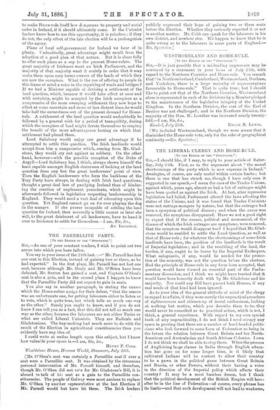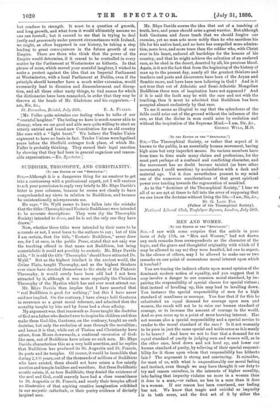THE LIBERAL CLERGY AND HOME-RULE.
[TO TEE EDITOR OF TEE "SPECTATOR."]
Sra,—I should like, if I may, to reply to your article of Satur- day, July 2 Rh. First, as to the argument about "the moral shortcomings of the party which is now supreme in Ireland." Analogies, of course, are only useful within certain limits ; but there is one that has struck me, though I have only Been it suggested in one speech,—I mean the case of the Trades Unions, against which, years ago, almost as bad a list of outrages might have been quoted as against the Irish. At last, after repressive legislation had failed, Parliament altered the laws affecting the status of the Unions, and it was found that Trades Unionists were not outrage-mongers by nature, but that the outrages bad. been a symptom of political disease ; and when the cause was removed, the symptoms disappeared. Have we not a good right to expect that if the causes, political and economical, of the disease of which the Irish outrages are symptoms, were removed, that the symptom would disappear too P I hoped that Mr. Glad- stone would be enabled to settle the Land Question, as well as that of Home-rule ; for whatever the shortcomings of some Irish landlords have been, the position of the landlords is the result of Imperial legislation ; and in the resettling of the land, the burden, if any, ought to be borne by the Imperial Exchequer. What safeguards, if any, would be needed for the protec- tion of the minority, was not the question beore the electors. Had the principle of Home-rule in any form been accepted, that question would have formed an essential part of the Parlia- mentary discussion, and I think we might have trusted that it would have been honestly dealt with by Mr. Gladstone and his majority. Nor could any Bill have passed both Houses, if any real needs of that kind had been ignored.
As to your idea of the general attitude of mind of the clergy in regard to affairs, if they were merely the unpractical preachers of righteousness and stirrers-up of moral enthusiasm, looking at nothing but motive, which you describe them to be, they would never be consulted as to practical action, which is not, I think, a general experience. With regard to my own special fault of airy unpracticality, I do not think I need occupy any space in proving that there are a number of hard-headed politi- cians who look forward to some form of Federation as being in the future the relation between Great Britain and her North- American and Australasian and South African Colonies. I own I do not think we shall be able to stop there. When the process of Anglicising large classes in India through English educa- tion has gone on for some longer time, is it likely that cultivated Indians will be content to allow their country to be a pawn in the political game between Great Britain and Russia, or other Powers, without their having a voice in the direction of the Imperial policy which affects their country ? It may be a most baseless dream, but I think that the political development of the British Empire will here- after be in the line of Federation—of course, every phrase has its limits—and that such development will not lead to weakness,
but conduce to strength. It must be a question of growth, and long growth, and what form it would ultimately assume no one can foretell ; but it seemed to me that in trying to deal justly and generously under present circumstances with Ireland, we might, as often happened in our history, be taking a step leading to great consequences in the future growth of our Empire. There are those who think that the power of the Empire would determine, if it ceased to be controlled in every matter by the Parliament at Westminster as hitherto. In that phrase of mine, which moved your scornful laughter, I wished to make a protest against the idea that an Imperial Parliament at Westminster, with a local Parliament at Dublin, even if the principle should hereafter have a mach wider extension, would necessarily lead to disunion and dismemberment and disrup- tion, and all those other nasty things, to find names for which the dictionaries have been ransacked, in order that they may be thrown at the heads of Mr. Gladstone and his supporters.—I am, Sir, dm., St. Banzabas, Bristol, July 26th, E. A. FULLER.
[Mr. Fuller quite mistakes our feeling when he talks of our "scornful laughter." The feeling we have is much nearer akin to dismay, when we see good and able men quite willing to start an utterly untried and brand-new Constitution for an old country like ours with a "light heart." We believe the Trades Union argument to have no basis in fact. Trades Unions were legalised years before the Sheffield outrages took place, of which Mr. Fuller is probably thinking. They earned their legal sanction by showing that they had been in general sagacious and reason- able organisations.—En. Spectator.]



































 Previous page
Previous page